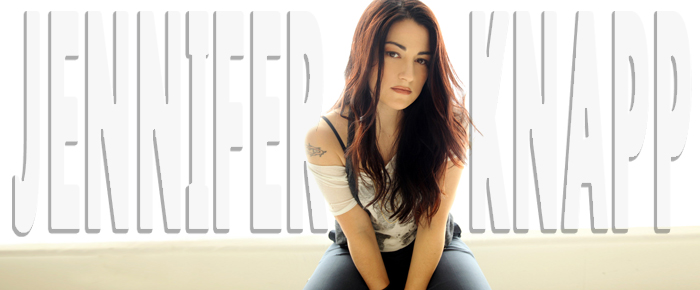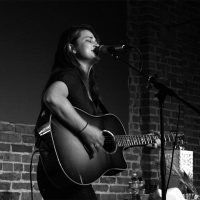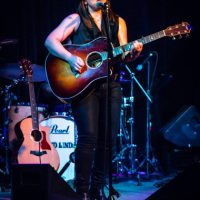
By Eleni P. Austin
Back in 2002, Jennifer Knapp was the biggest star in Contemporary Christian Music. But she walked away from it all to lead a more authentic life.
Jennifer Knapp and her twin sister, Lori, were born in Chanute, Kansas in 1974. Her parents divorced when the twins were three years old. She endured an unhappy (and non-religious) childhood, living with her remarried father until she left for college.
It was at tiny Pittsburg State University that Knapp converted to Christianity. Although she studied trumpet throughout high school, it wasn’t until college that she began performing her own music.
Knapp’s self-released debut, Circle Back arrived in 1994. She quickly followed up in 1996 with Wishing Well, selling both CDs at her shows. That album garnered some attention from the independent, Contemporary Christian label, Gotee.
Founded in 1994 by former dc. talk member, Toby McKeehan (ne’ Tobymac), the label had a distribution deal with industry giant, EMI/Capitol. They signed Knapp and got her into the studio for what would be her breakthrough album, Kansas.
Kansas was a revelation. Most Contemporary Christian Music comes across as gentle Soft Rock anthems to “Him.” The glory of “Him,” the wonder of “Him,” the inevitable infallibility of “Him.” Jennifer Knapp flipped the script.
Her album was filled with songs of introspection and self-doubt, laced with spirituality. More importantly, the melodies and instrumentation actually rocked. The album catapulted to the top of the CCM charts and was certified gold.
Her next two albums continued the trend, Lay It Down, arrived in 2000, shot to #1, and received a Grammy nomination. It also included a knowing cover version of Shawn Colvin’s “Diamond In The Rough.”
Knapp quickly returned with The Way I Am in 2001. That one also made the Top 10. The songs on both albums strike a tone of humble reflection. She is always questioning, herself, her God and society.
The decision to take a break from touring and recording in 2002 was viewed as career suicide, but Knapp was adamant. The relentless tour schedule that followed the release of each left her feeling burnt out, physically and emotionally. Also, there was a part of her that Knapp could no longer deny her sexuality.
During her unhappy teen years, Knapp turned to alcohol and sex to dull the pain. Of course that ended once she had converted to Christianity. However, following that life-altering event, she also
realized that she was gay. Because that lifestyle felt like the complete antithesis of her evangelical teachings, she chose to remain celibate.
One of the reasons Knapp took her sabbatical was because she fell in love. Feeling she couldn’t continue her career, she put down her guitar and relocated with her partner to Australia. There she was free to live her life without scrutiny.
By 2009, Knapp felt the need to return to music. After writing a plethora of new songs she returned to the United States, setting up house with her partner in Nashville. By early 2010, she released her first secular album, Letting Go, through the independent label, Graylin. She also came out.
Predictably, most of the Christian community renounced her, and the Gay community embraced her. Throughout the firestorm of controversy, Knapp realized being gay and Christian are not mutually exclusive.
In 2011, she founded Inside Out Faith, an advocacy organization for LGBT people of faith. Sharing her coming out journey at churches and universities inspired Knapp to write her autobiography. “Facing The Music: My Story” was published in 2014 by Howard Books, a religious imprint of Simon Schuster.
She also found a perfect home for her music, Righteous Babe Records. Founded by Folk-Punk warrior/iconoclast, Ani Difranco in 1990, the Buffalo, New York label is a haven for uncompromising artists. Set Me Free is her first album for the label.
The album is off to a rollicking start with “Remedy,” a crackling rocker propelled by peppery guitar riffs and a driving backbeat. Here she revisits her Kansas roots with mixed results. Her past feels like an albatross. “You’ve been around my neck so burdensome you say I’ve changed, you rue what I’ve become.”
Much like “Letting Go,” on this record she is free to explore the myriad twists and turns of love. Four tracks, “What Might Have Been,” “Why Wait,” “So Happy” and “The Tale” chart the highs and lows of romance.
“What Might Have Been” is a sharp treatise on carnal attraction. Acoustic and electric guitars intertwine over feathery violin and a slow groove that is equal parts liquid and languid. Knapp paints a vivid portrait of the frisson of desire. “You are like the spice of tobacco on my lips, the cardinal sin/You’re no good for me, still I proceed, damned for the taste of you darling.”
The urgent and anthemic melody of “Why Wait” shares some musical DNA with Jackson Browne’s “Running On Empty. The arrangement is powered by scorching guitar licks, pounding piano runs and a breakneck beat. The lyrics plant the seeds of erotic betrayal. “I believe in what you say, that this is not what it looks like/It’s just an ordinary night.”
By “So Happy” the façade has cracked. Over gritty guitar, honeyed keys and a mid-tempo rhythm, promises are made and deals are struck, but nothing is resolved. “…all I have to share with you, these moments fleeting/I am not the one who’s leaving you out, don’t leave me out.”
By “The Tale,” the writing is on the wall. Splinter-y guitar riffs skate over a minor key waltz. Knapp’s double-tracked vocals soar as she navigates the shoals of recrimination and regret. Her heart in tatters, she resolves to learn from her emotional battle scars. “Usually blows like this leave a mark so I can remember/Leave me safe so I won’t embark on some new adventure.”
Both “Set Me Free” and “Mercy Tree” slyly address her break with the Evangelical community. The former is tethered to a loping rhythm. Sweet acoustic arpeggios blend with sawing violin notes and tinkling piano fills. Knapp is defiant, “Should I find my resting place amidst the ruins of shame and disgrace/Who are you to care? You’re no longer there to judge what I’ve become.”
The latter is propelled by shimmering, spiraling guitars and a stuttery beat. She offers some astute criticism…”We trade truth for a banner, a slogan or two/Underneath it we all look insane…We hold our breath when the winter comes, act as if faith makes the springtime bring the sun/What have we done.”
Other interesting tracks include “Neosho.” A clear-eyed tribute to the tributary that runs from Kansas to Texas. The lyrics take a sweeter pass at childhood memories without papering over the pain. Knapp also offers up a rustic revision of Anita Baker’s Quiet Storm classic, “Sweet Love.” Meanwhile, the sunny melody of “The End” belies lyrics of equivocation and loss.
The album closes with the quiet contemplation of “Come Back.” Here Knapp suggests that anything worthwhile requires struggle. “Who said easy was what we wanted or what we need/It takes blood to make good history.”
“Set Me Free” is packed with hook-filled melodies, and Knapp has a sure facility with language. But her voice is the album’s secret weapon: Tremulous and earthy one minute, soaring and crystalline the next. Her singing is rich and nuanced and eloquent.
Jennifer Knapp may never enjoy the same commercial success that accompanied her CCM career, but that’s okay. She has crafted an excellent record, while remaining true to herself. What could be better?













































